Saturday, September 23, 2006
Grapes, onions and the rural life
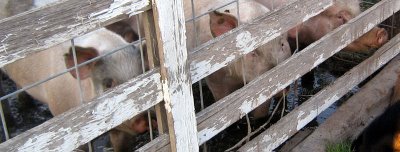
September 22:
We’re just outside Walla Walla now, after being delayed in our departure from Port Orchard.
We took my close friends W. and A. out to lunch Thursday in gratitude for letting us stay with them. They suggested a very nice sandwich shop, where Val had an unfortunate allergic reaction to the nuts in the pear chutney (is there something I don’t know about chutney?). We spent the rest of the day recovering.
By nightfall we were on the road, though. I figured there was no way we would make it to Walla Walla before crashing for the night, so I planned on getting us to Ellensburg, about halfway there.
Beaker snarled up the winding Highway 18 in third gear, passing semis unable to reach 60 mph. It had rained the last few days, but this night it was clear, and the evaporating puddles created clinging rafts of steam just above the roadway. With the thick forest obscuring any ambient light [pollution], things got very eerie.
We finally stopped to eat “dinner” in Cle Elum (looks like some half-assed anagram for something), a town near the summit. It was 9:30, but it felt like 2 a.m. We found a Burger King and sat down to eat. We were the only non-drive-thru patrons. For the rest of the night it would feel as if we were alone in a tarnished fast-food world, reluctant patrons of a vast, surprisingly uncomfortable hospitality machine designed for the massive clans in vans who were all by now in $150-a-night motel rooms they reserved two weeks ago.
I hit the gas as we hit the downhill grade, trying to get to Ellensburg before 11 p.m.
We made it, but only to find the town consisted of two highway offramps and about four hotels, all of which were crammed with gargantuan trucks, buses and station wagons.
“WELCOME CONTRACTORS AND SURVEYORS ASSOCIATION CONFERENCE,” all the marquees in town read. There were white F-250s in every parking lot to prove it, and no single-bed rooms left in the Comfort Inn. The clerk offered us a smoking suite, which we wrinkled our noses at. We finally settled on a local motel, there for 35 years according to the clerk at the neighboring Holiday Inn Express, paying a reduced $72 AAA rate for a room down the longest goddamn hall I have ever seen outside of The Shining. I thought we were going to get lost.
I was anxious to get out of town the next morning. The overpriced hotel room with the tiny TV and no wireless Internet left a bad taste in my mouth. We checked out and looked around. All I saw was offramp sprawl on either side of us. I hear Ellensburg has a beautiful college campus, but I’m less than impressed with the part of town we saw.
We decided to eat in Yakima, just about 40 miles down Interstate 90 from Ellensburg. We drove through hills spotted with scrub brush, past what the map indicated was a military firing zone, and downhill to a plain checked with farmland.
According to its Web site, Yakima is a city of 70,000. They must live underground. All we saw were run-down, single-story residential neighborhoods and a few fast food joints and car dealerships.
And the entire town appeared to have shown up for the Central Washington State Fair. The line of cars waiting to turn left along the choked avenues bordering the fair stretched a good half mile or more. Nearby residents were charging as much for parking space on their lawns—$5— as we would have paid to park near the Space Needle. We did not go to the Yakima Fair.
After we found an Arby’s and had lunch, it was time to get gas. We drove down a street lined with squat buildings selling tractors, used cars and various pawned items, but couldn’t find a single gas station.
“Where the hell do people get gas in this town?” I said.
“Maybe they don’t use gas,” Val said. “Maybe the whole town runs on used cooking oil or something.
“You mean BioDiesel?” I said, looking at the pawn shops and vacant storefronts, remembering the hairy back of a NASCAR hat-wearing man whose thrift-bought Nautica shirt was riding up as he arose from his booth at the Arby’s. “This does not look like a town that cares about BioDiesel.”
Val nodded. “This is a town built on grease,” she said. Then we found the sign leading back to the interstate. We found a gas station, refueled, and on our way out, Val pulled partly into an intersection but didn’t turn left before the light went red. As we sat there waiting for the light to turn again, she pointed to a small black object at the top of the light post.
“Look. It’s one of those traffic cameras,” she said as I wondered whether Big Brother cared if our front wheels were over the crosswalk. I expect to have nightmares about getting recalled to Yakima for traffic court.
After lunch today (and the accompanying feeling of resignation to fast food lunches, both for expediency and economics), we realize perhaps our readership would benefit from a series of restaurant reviews.
The Burger King in Cle Elum was eerie and disappointing. Granted, we ate there half an hour before closing time, but the Swiss & Mushroom Black Angus Burger I ordered was small, skimpy on the mushrooms and lacking crucial pizzazz.
I guess it didn’t matter much, since it felt a little bit like we had stumbled into a restaurant preserved from the apocalypse by its remote forest location. I can’t imagine it would be very easy to enjoy even the choicest BK Black Angus Burger if it was served to you by a hissing albino vampire.
Two stars (one given for a friendly teenage attendant who had to mop the entire floor while we ate).
The Arby’s in Yakima, on the other hand, was surprisingly serene. We ate there at roughly 12:30 p.m., and the place was nearly empty (due, I suspect, to the orgiastic frenzy of the fair). They were offering a “select 5 for $5.95” deal, which I opted for. I got three Arby’s melts, curly fries and a soda. It brought me back to the days when a trip to Chico with my dad would end with us at the Arby’s there, ordering 10 sandwiches during their “5 for $5” deals, dad cringing when the pimply cashier leaned out the window and asked him what kind of sauce he wanted (calling it “horseradish sauce” was generally not specific enough a request to get the “Horsey” sauce we favored).
The restaurants also have some new kind of three-pepper sauce that goes great with curly fries and their roast beef sandwiches. While we ate, one of the cashiers came by with a basket of mints and offered them to us. Truly an extra gesture of classiness.
And classiness can only be a good thing from a restaurant whose idea of menu diversity comes largely from drenching pressed beef slices with nacho cheese.
Val looked at her beef melt sandwich suspiciously and said, “this cheese is a little much, even for me.” She loves nacho cheese.
So, class points for the mints and the bottomless sauce dispensers, trash points for the nacho cheese strategy. All in all, three stars.
***
We arrived in Walla Walla after 4 p.m. and immediately drove to the winery where Val’s friend L. works. We passed scads of sweet onion farms. As Val has told me, the Walla Walla region is the only place where these sweet onions will grow, so it’s become a regional specialty.
But now another specialty is threatening to eclipse the town’s bulby heritage: . There are now more than 70 wineries in the immediate area, up from around 40 just a few years ago. And like the wineries, who offer wine tasting and who see visitors come from as far as Tennessee to try the bottles, Walla Walla itself is beginning to skew upscale.
The downtown area has been nicely renovated. Its historic brick buildings boast an increasing number of boutiques. The chocolate store sells $12 boxes of wine-flavored jelly candies.
But things are much the same as decades past in the fields outside of town.
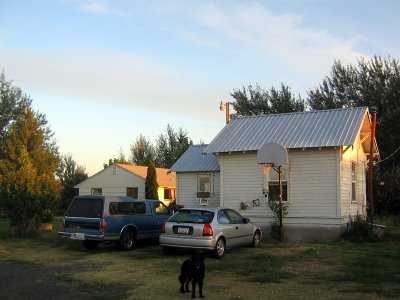 L. lives with her boyfriend and his children in a small house on 10 acres of farmland. They’re starting to raise animals: chickens, pigeons, several cows, four pigs and a horse.
L. lives with her boyfriend and his children in a small house on 10 acres of farmland. They’re starting to raise animals: chickens, pigeons, several cows, four pigs and a horse.They’re also into stock car racing. Up on ramps in the driveway was a battered Buick of indeterminate age. L. said they got it for free from an acquaintance; they plan to race it in October.
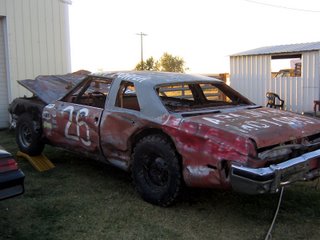
Val took one look and said, “Oh my god, is that moss growing on the rear window sill?”
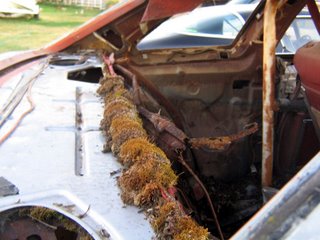
“This is as clean as I’ve seen it,” L. replied. “You should have seen it when we picked it up.”
She took us around the side of their shop and pointed to the racecar graveyard, a cluster of decaying American coupes from the ’70s and ’80s in the tall yellow grass.
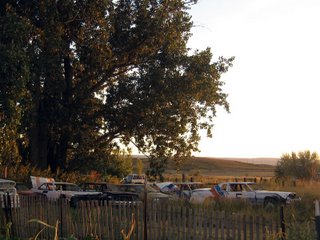
She told us she had been behind the wheel of the latest addition to the wreckage—the car’s rear axle had snapped in the middle of a race.
Later, as the sun set, she took us out to meet the cows and the horse.
“I just love the cows,” L. said. “I never thought I would, but they’re such sweethearts.” She took us out to where the bovines were grazing, her two dogs racing figure-8s around us. True to her description, the cows were friendly, docile animals who sniffed and licked our outstretched hands and then gently nudged our legs with their heads in a bid to get their necks scratched.
V., the teenage daughter of L.’s boyfriend, also came out with us to try to grab the horse. The tall, quiet girl looked a little peculiar in big black galoshes, but as soon as I had dodged my third cow pie, I realized why she wore them.
The horse was finicky and would not be caught. After it bucked past us a few times, V. gave up on the idea.
“Hey, maybe you could show them the trick with the cow,” L. suggested. V. didn’t hesitate. She walked up behind the black and white animal, took five running steps and leaped onto its back. Dik, the most personable of the family’s herd, hardly looked up from his tuft of grass. Then for a moment everyone was silent and still. I was treated to the quixotic silhouette of a lanky, six-foot-tall figure atop a cow, framed by the sunset.
“The only problem is he won’t move,” V. said from her perch.
As we walked back to the house, I asked L. if she had grown up on a farm.
“Oh no,” she said. “I grew up in Sacramento, with big buildings and lots of neighbors. I never thought I’d wind up here.”
She was attending college in Chico when her parents moved to Walla Walla. She met her boyfriend there while visiting them and soon moved up.
“The rural life was mine to choose,” she said, “and I love it.”
***
2 a.m.
We’re blazing down a Washington backroad at 85 mph, chasing after a pickup driven by M., the boyfriend of L., one of Val’s college friends. We’re actually driving L.’s truck, too, for complicated logistical reasons. The little GMC S-15 has plenty of pep, which is good, because we’re chasing a V-8 Silverado with a prison guard on painkillers behind the wheel.
We’re chasing him because he knows the way home and we don’t. It was fine following him on surface streets, since stop signs kept him fairly close, but out here in the boonies, stop signs are scarce. From a previous trip in the daylight, we know these roads are desolate, surrounded by cow pastures and lined with mailboxes so far away from their residences that L. said “people drive four-wheelers to get their mail.”
L.’s boyfriend is on painkillers because he may have broken his elbow. He doesn’t really know. He went to the hospital to get it checked, they gave him a prescription and wrapped it in an ACE bandage, told him to take it easy. He drove from the hospital to meet us out at the bars in Walla Walla, determined not to miss a Friday night with his circle of friends from the correctional facility.
M. managed to pull away from us at the last stop sign, flooring it and racing ahead while I looked both ways before proceeding. Now, as I race to catch up, his taillights disappear. It’s completely dark ahead of the S-15 now, but I know he hasn’t crashed. He’s just gone stealth mode, burning asphalt at 85 with no lights. He knows these roads. I just hope we’re close to their home and no cows are out for a witching-hour constitutional.
We found out M. had hurt himself just a few minutes before we went out to the bars. L. called him and muttered a few shocked words.
M. has had his share of accidents—many broken bones from recreational mishaps. Once, L. explained, he was riding a dirt bike in a field. It flipped and landed on him, breaking his collarbone.
“He was kind of beat up because the bike landed on him and he was afraid he might be bleeding internally, so he decided to take himself to the hospital,” L. said. “But his kids had all gathered at the fence to watch him, so he had to get up and raise his hand to show he was OK. Only he couldn’t raise his hand all the way because of the injury. He told them he had to go to town to get some bread and went to the hospital.”
Another time, L. said, M. had carved her name with a chainsaw in a tree trunk while out cutting firewood. He then cut himself a crude bench in the wood. But something went wrong when he set the chainsaw down, and it cut his knee open. L. likes to joke that the local hospital has a special room for him.
This time, however, the injury was work related. Since L. said M. usually doesn’t like to talk about his experiences at work, we didn’t ask. When we got home, though, he saw my laptop and asked what I was doing. I told him we were working on a blog.
“No more secrets,” he said, and explained to us what happened. More or less. It was some kind of prison scuffle in which he reportedly was defending another guard.
“I bashed the head of a murderer,” M. said, his eyes wide. “He was a convicted murderer. Brought my elbow down on top of his head like this.” He flexed his bicep and dropped his arm in pantomime. “They gave me some medicine and an ACE bandage. I don’t even get any extra pay.”
He sat down on the couch and looked at us, our gear spread out on the coffee table, mattress in the middle of the living room.
“You guys want to write your history, you should stay a week,” he said. “That’s enough time for us to have some history.”
